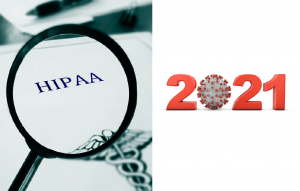 2021 has already brought updates for health FSA and dependent care benefits with the Consolidated Appropriations Act, as well as on the proposed Privacy Rule changes after the Department of Health and Human Services (HHS) made modifications in December 2020. For this blog, we will touch on both to help bring some clarity.
2021 has already brought updates for health FSA and dependent care benefits with the Consolidated Appropriations Act, as well as on the proposed Privacy Rule changes after the Department of Health and Human Services (HHS) made modifications in December 2020. For this blog, we will touch on both to help bring some clarity.
Note: Regarding the notice on transparency in the Consolidated Appropriations Act, in which ERISA H&W plans are to report when brokers and consultants receive $1,000 from the Plan, Wrangle is studying this information and will report in the future on our findings.
Changes to HIPAA
Key Note from Wrangle’s ERISA Desk: In December 2020, the Department of Health and Human Services released proposed modifications to the HIPAA Privacy Rule. Once the changes are finalized (probably in about six months), Wrangle will review and revise the HIPAA Privacy language in our Plan Document accordingly.
Specific changes to the Privacy Rule listed in the notice of proposed rulemaking include the following, among many others:
1. Adding definitions for the terms “electronic health record” and “personal health application”
2. Modifying provisions on individuals’ right of access to personal health information (PHI) in a variety of ways, including strengthened rights of inspection and shortened required response times from covered entities
3. Clarifying the scope of covered entities’ abilities to disclose PHI to social service agencies, community-based organizations, and similar third parties providing health-related services
4. Eliminating a requirement to obtain an individual’s written acknowledgment of receipt of a direct treatment, provider’s notice of privacy practices (NPP), and modifying the content requirement applicable to NPPs to clarify individuals’ rights, with respect to their PHI, and how to exercise them
5. Reducing the identity verification burden on individuals exercising their right to access
Consolidated Appropriations Act, 2021 for Healthcare FSAs and Dependent Care FSAs
Key notes:
1. Plan Sponsors are allowed, but not required, to make changes
2. The changes involve participant election changes, extensions of grace periods, increase in carried over amounts, a Healthcare FSA spend-down option for terminated employees, and an increase in age of eligible dependents for purposes of a Dependent Care FSA
3. Health FSAs and DCFSAs must be amended by the last day of the first calendar year, beginning after the end of the 2020 calendar year
a. If the plan year you wish to amend runs from January 1, 2020 through December 31, 2020, plan amendments must be adopted by December 31, 2021
b. If the plan year you wish to amend runs from July 1, 2020 through June 30, 2021, plan amendments must be adopted by December 31, 2022
4. In the interim, the plan must operate consistent with the terms of the amendment
Message from the ERISA Desk:
Should the plan sponsor adopt these discretionary changes, an Amendment and SMM to the Plan Document and SPD would be necessary to update their ERISA plan documents. Please reach out to Aubrey Box at abox@wrangle5500.com for more information.
Summary
Temporary Special Rules for Health FSAs and Dependent Care FSAs
- For plan years ending in 2020, the plan can permit a carryover of all unused benefits to the plan year ending in 2021
- For plan years ending in 2021, the plan can permit a carryover of all unused benefits to the plan year ending in 2022.
- If a grace period is associated with the plan year that ends in 2020 or 2021, that grace period can be extended for 12 months after the end of the plan year (the normal maximum grace period is 2½ months after the end of the plan year).
- For Plans that end in 2021, participants will be permitted to prospectively modify their contribution elections (without regard to a change in status).
Temporary Special Rules for Just Health FSAs
- Similar to existing spend-down rules already in place for Dependent Care FSAs, Health FSAs may permit employees who cease participation mid-plan year in 2020 or 2021 (e.g., due to termination of employment) to continue to receive reimbursements from unused account balances through the end of the plan year, in which such participation ceased (including any grace period).
Temporary Special Rules for Just Dependent Care FSAs
If the dependent “aged-out” during the pandemic, the plan can substitute age 14 for age 13 (as the maximum age the child could be considered a qualifying person under the plan), as long as the employee was:
- Enrolled in the DCAP for a plan year where the end of the regular enrollment period was on or before January 31, 2020,
- And the employee had one or more dependents who attained age 13 during the plan year,
- And the employee had an unused balance for a plan year that will be carried forward to the subsequent plan year.
Wrangle will continue to monitor and bring to you our latest findings in coming blogs. If at any time you have questions, don’t hesitate to let us know. For this particular blog, questions can be directed to Aubrey Box at abox@wrangle5500.com.
